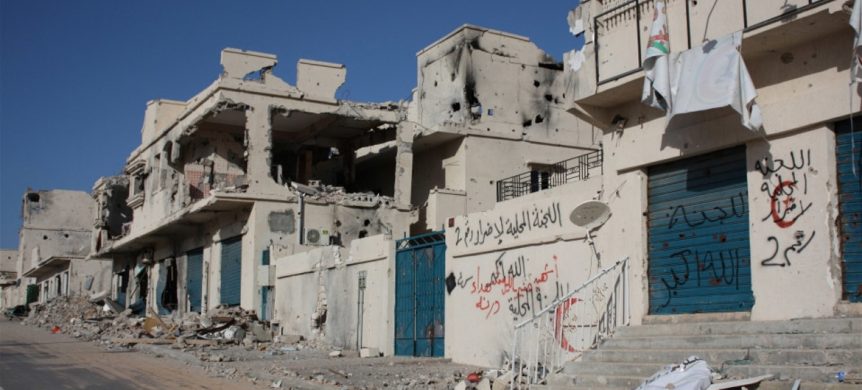An Endless Proxy War is Preventing Libya from Addressing the Covid-19 Pandemic
The Libya Platform[1] and CIHRS urge the international community to act immediately to deter Libyan parties and their regional and international allies from pre-empting the possibility of a genuine and respected humanitarian truce in Libya, urgently needed to face the Covid-19 pandemic. This week, Khalifa Haftar, commander of the self-proclaimed Libya National Army (LNA), declared his acceptance of a “popular mandate” to unilaterally rule over the country, thereby ending five years of negotiations to find a peaceful solution to the conflict in Libya. On April 29, the LNA then announced a ceasefire for the month of Ramadan.
In the last year, multiple attempts to halt hostilities have faltered, with warring parties and their foreign backers committed to escalating the fighting at any cost. Ceasefire announcements have not led to any real and concrete cessation of hostilities on the ground.
The war will most likely never produce a definite victory for either side. Neither of the main warring parties, which both include extremist groups within their ranks, have been able to exercise military control over the country, as the assault on Tripoli has entered its second year. Endless conflict means that the local population continues to suffer from the devastation of the country, with repeated indiscriminate attacks on civilians and the destruction of medical and other civilian infrastructure, in large part originating from the LNA and affiliated forces. There have also been reports of retributive violence such as the attack from GNA government-affiliated forces on Tarhuna, Sabratha and Sorman in April 2020 and on Gharyan in August 2019, preceded by similar vengeful acts against the city of Murzuq in February 2019 from the LNA. Only last week, indiscriminate shelling caused five deaths and 28 injuries. Since April 2019 until March 2020, 685 were killed and 329 injured due to the escalation of fighting in the West.
To end this destructive cycle, and in the context of the global threat of the Covid-19 pandemic, the international community must hold belligerents and their foreign backers accountable for their actions. We urge States and international institutions to:
- Use all diplomatic means to build concerted pressure on Libyan warring parties and their foreign backers for a genuine and lasting cessation of hostilities.
- Hold accountable those responsible for attacks against medical infrastructure, a violation of international humanitarian law.
- Clearly and publicly condemn any attempt to unilaterally take control of the country and subvert Libyan institutions in favour of a military state.
- Monitor and publicise evidence of violations to the arms embargo from all sides of the conflict and share the findings with the UN Sanctions Committee.
- Implement sanctions against individuals responsible for violations whether through the UN, the EU or national level, as well as legal action through universal jurisdiction.
- Establishing independent accountability mechanism at the UN Human Rights Council.
Since April 2019, the conflict has caused widespread damage to health facilities and other infrastructure in the capital. Vulnerable groups such as migrants, refugees, and hundreds of thousands of internally displaced people (IDPs), as well as Libyan women have been left especially at risk. In the past few months of 2020, while the world was distracted by a global epidemic, Libyan warring parties have escalated fighting and brought in even more weapons and foreign fighters with complete impunity. This escalation in the fighting goes against calls made by the UN Secretary General for a global ceasefire, as well as calls from the UN Mission in Libya for a humanitarian pause. It must be brought to an end.
Most notably, in recent weeks Libya has witnessed systematic attacks on already overstretched medical personnel and facilities. On the 17 April, the Royal Clinic hospital was hit by airstrikes causing damage to an intensive care unit and the evacuation of both patients and medical staff. Al-Khadra Hospital, treating Covid-19 patients, was attacked three consecutive times, during the first week of April as part of the LNA’s attempt to take control of Tripoli by force. An ambulance was also attacked in Misrata, killing a paramedic. At the end of March 2020, a total of 37 health facilities had been damaged by these indiscriminate attacks. In addition, electricity and water supply cuts, and a blockade of oil ports, in areas under the control of the LNA, have further worsened living conditions and have been assimilated to collective punishment against civilians in the Western region. While people around the world protect themselves from Covid-19 by remaining within the confines of their homes, Libyans at home risk indiscriminate shelling.
Without an end to the fighting, Covid-19 will not be brought under control in Libya, presenting a grave threat to vulnerable groups within the civilian population and undermining global efforts to contain and ultimately overcome the virus.
[1] The Libya Platform is a Libyan human rights coalition established in 2016 by the Cairo Institute for Human Rights Studies (CIHRS), currently gathering 11 human rights organisations.
Photo: The streets of Sirte heavily damaged.
Share this Post

